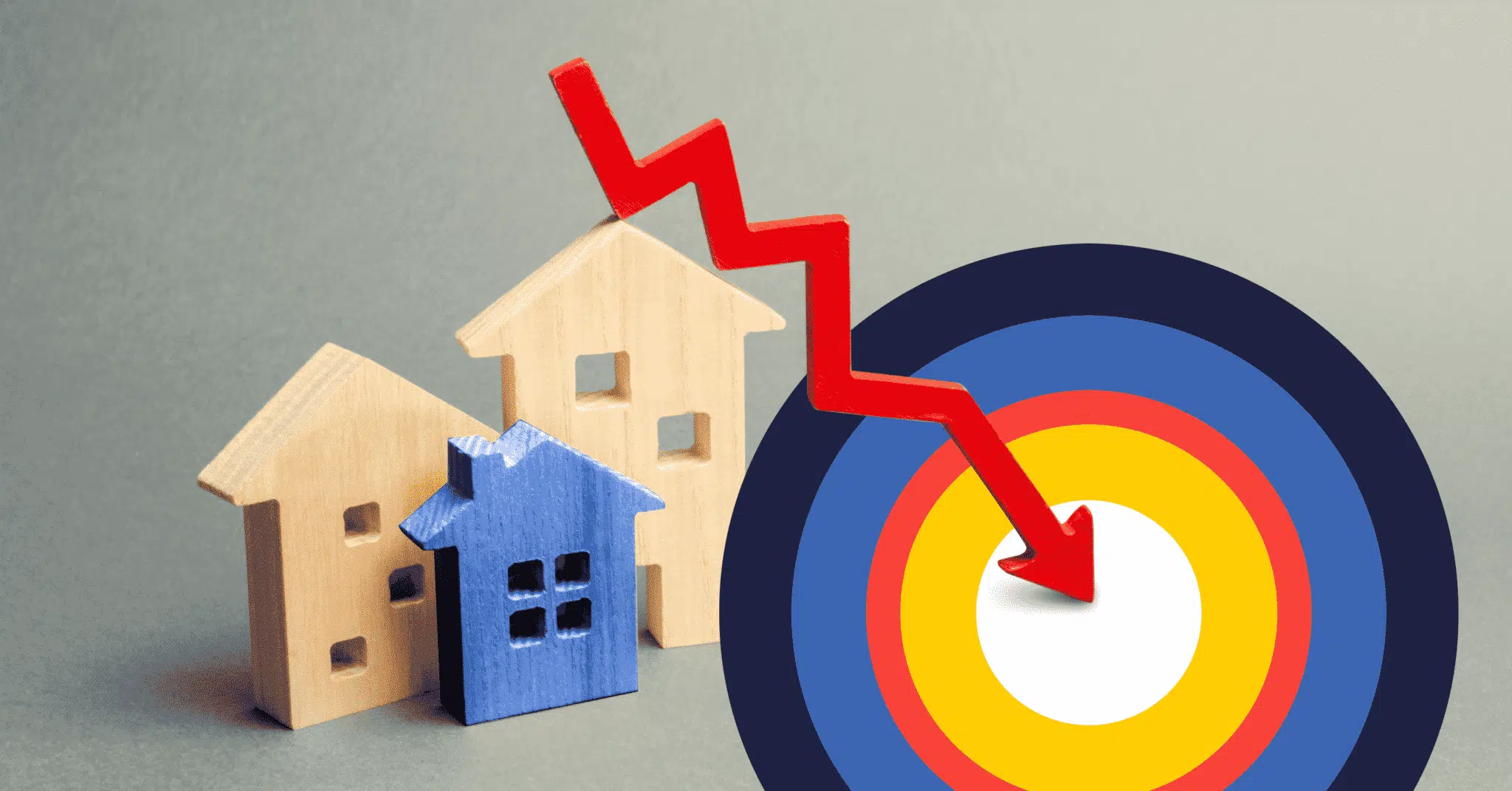Renewal and Refinancing #Real Estate
Renewal and Refinancing #Real Estate
What Interest Rate Cuts Will Do To Mortgage Holders In Canada

Table of contents
The Bank of Canada (BoC) cut overnight rates twice in one month back in March 2020 in tandem with the US Fed when the COVID pandemic first hit North America. But as inflation started surging by the beginning of 2022, Canadian and American central banks started their rate-tightening cycle to bring it under control.
After 8 increases to the key policy interest rate over 9 months, the Bank of Canada decided to hold its key interest rate on its last two interest rate decisions, diverging from the increases still taking place stateside. These are the highest interest rates seen over the past decade, leaving many Canadians wondering what the impact will be on their mortgages as rates head down.
Key Highlights
- Variable and adjustable mortgages see real savings in tandem with prime rate cuts.
- Fixed mortgages do not benefit from rate cuts until they come up for renewal or unless the borrower decides to refinance before maturity.
- Rate cuts can negatively and positively impact Canada’s housing market and inflation.
What To Expect When Interest Rates Are Cut In Canada
An interest rate cut by the Bank of Canada doesn’t necessarily mean mortgage rates will drop automatically. The bank prime rate is influenced by the Bank of Canada policy rate. This, in turn, determines each lender’s prime rate by a factor of 2.20% from the federal government’s overnight rate. The Bank’s prime rates currently stand at 6.70%, with a difference of 2.20% from the 4.50% policy rate at the Bank of Canada. While rate cuts may lower borrowing costs for banks, mortgage rates might not decrease.
Mortgagors may have varying effects depending on the Bank of Canada’s rate cuts. Lower interest rates could increase home prices as demand increases from more qualified borrowers. This lack of price stability scenario could add to the disadvantage first-time homebuyers already feel when entering today’s housing market.
Rate cuts by the Bank of Canada mean reducing the cost of borrowing money for loans. While this move can have beneficial effects, such as making it more feasible for businesses and individuals to fund capital investments or qualify for mortgages, it could also create a resurgence of inflationary pressures and further weaken the Canadian economy.
Will Interest Rates Drop In Canada In 2023?
Most people want to know whether Canadian interest rates will decrease by 2023. It can be challenging to forecast the future with certainty as several factors could impact interest rates in the coming years. It really depends on the state of the economy.
As the pandemic’s effects linger, economic repercussions from inflation (among others) lead to higher interest rates as the demand for credit grows. However, interest rates have continued to surge, causing a slowdown. Bank of Canada governor Tiff Macklem dismissed speculation over rate cuts despite the bond markets anticipating it would happen.
According to Macklem, a rate hike may still be on the table to bring inflation down to 2%. On the other hand, Derek Holt, head of Capital Markets Economics at Scotiabank, believes that the Bank of Canada’s forecast showing a return to 2% inflation in the medium term feeds the market’s anticipation of a rate cut.
Additionally, it’s worth noting that global economic trends and events can significantly impact Canada’s interest rates. For instance, changes in the global or US economy, like a recession or significant geopolitical events, have a natural knock-on effect on us.
Find a better rate, and we’ll match it, beat it, or give you $500*.
*Conditions Apply
With nesto, it’s stress-free
How BoC Interest Rate Cuts Will Impact Variable Mortgage Holders
Unlike a fixed-rate mortgage, where the interest rate stays the same for the entire term, a variable mortgage has an interest rate that fluctuates with the prime rate set by the lender. This prime rate is anchored to BoC overnight policy rate. This means that when the BoC lowers its key interest rate, variable mortgage holders can expect a decrease in their mortgage payments.
How much of an impact will an interest rate cut have on your variable mortgage?
Well, it depends on a few factors:
- the size of your mortgage
- – the remaining term,
- the interest rate you’re currently paying all play a role in determining how much you’ll save.
For example:
Let’s say you have a $300,000 mortgage with a remaining term of 20 years and an interest rate of 5.50%.
- If the BoC lowers its interest rate by 0.25%, your monthly mortgage payment could decrease by around $41. Over a year, that’s a savings of $492.
The decrease in your monthly payment is less significant the lower your interest rate compared to our example.
BoC interest rate cuts can positively impact variable mortgage holders, but weighing the risks and benefits before making any decisions about your mortgage is essential. It’s advisable to remember that interest rates can go up just as quickly as they can go down. While variable mortgage holders may benefit from lower payments with the BoC’s policy rate decrease, they risk seeing their payments increase if they decide to raise rates instead.
Variable Mortgages With Fixed Payments
If you have a variable-rate mortgage with fixed payments, you may be particularly curious about the impact of these cuts. A variable-rate mortgage with fixed payments has a fluctuating interest rate that changes with the BoC’s prime rate. However, the borrower has chosen to make fixed payments, meaning that the amount they pay each month remains the same regardless of changes in the interest rate.
The Bank of Canada’s onerous rate-hiking cycle surprised variable-rate mortgage borrowers. As a result, those with adjustable payments saw a sharp increase in their mortgage payments as the interest component increased. In contrast, those with fixed payments saw an increase in the interest component while their monthly payments remained unchanged. This led to an extended mortgage amortization period, increasing the total time to repay the loan.
So, how do BoC interest rate cuts affect this type of mortgage? When the BoC lowers its prime rate, the interest rate on a variable-rate mortgage will also decrease. However, because the borrower has chosen to make fixed payments, their monthly payment amount will not change. Instead, the extra money that would have gone towards interest payments will be applied towards the mortgage’s principal, meaning that the borrower will pay off their mortgage faster.
For instance:
Let’s say you have a $300,000 mortgage with a 25-year amortization period and a variable interest rate of prime (currently 6.70% at nesto) less 1.20%. Your current monthly payment is $1,831.17.
- If the BoC cuts its prime rate by 0.25%, your interest rate will decrease by 0.25%, bringing your new interest rate to 5.25%.
- However, because you have chosen to keep fixed payments of $1,831.17, your extra payment amount of $42.43 monthly would be applied towards your principal.
This means you would repay your mortgage faster and save on the total interest paid over the long run.
Variable Mortgages With Variable Payments
While BoC interest rate cuts can benefit variable mortgage holders with fixed payments, they may only sometimes be good news for other borrowers. For instance, if you have a fixed-rate mortgage, your interest rate will not change with BoC rate cuts. Concurrently, if you have a variable-rate mortgage with variable payments, more commonly known as an adjustable-rate mortgage (ARM), your monthly payment amount will decrease with BoC rate cuts.
If you have a variable payment amount, your payments will decrease when interest rates decrease. This can be a great relief for those struggling to make ends meet. Lower interest rates may seem reasonable but could lead to higher inflation. Freeing borrowers’ cashflow can lead to more disposable income for purchases creating a surge in demand. Higher prices for goods and services will follow, offsetting any savings you may have from lower mortgage payments.
How Interest Rate Cuts Impact Your Trigger Rate
You may have heard the term “trigger rate” thrown around when discussing interest rates. But what exactly is a trigger rate, and how does it relate to interest rate cuts? A triggered mortgage reaches a critical point called a trigger rate, where little to no payment goes towards paying the principal. Interest rate cuts can impact your trigger rate and potentially lead to savings on your mortgage.
The surging interest rates have mortgagors with fixed-payment variable-rate mortgages finding that a more significant portion of their payments goes towards paying off the interest rather than the principal balance. This would prolong their mortgage amortization, taking longer to become mortgage free.
To ensure their clients keep paying off part of the mortgage balance, some financial institutions require increased payments while others only suggest them – only to a point. Lenders will have restrictions based on the loan-to-value (LTV) or allow for negative amortization. Mortgagors with insured mortgages, whose original downpayment is below 20%, would benefit from a comfortable 105% LTV—allowing them to increase their mortgage by 5% beyond the original property value.
Uninsured mortgages, which start with 20% or more equity at the time of purchase or refinance, may be allowed to accrue negative amortization. Typically amortization decreases as interest is paid off with each monthly mortgage payment. However, negative amortization allows the amortization to increase with each monthly mortgage payment, as the total amount of interest and principal due is not covered with each payment.
How BoC Interest Rate Cuts Will Impact Fixed Mortgage Holders
As a fixed mortgage holder, you may wonder how Bank of Canada (BoC) interest rate cuts would impact your mortgage. It’s important to understand that fixed mortgage rates are not directly tied to the BoC interest rate. The bond market determines fixed mortgage rates. Additionally, they are influenced by factors such as inflation, economic growth, supply chain, labour markets and global events.
The BoC overnight policy interest rate future expectations of increases or reductions can indirectly impact the current fixed mortgage rates available for borrowers in the market undertaking a new fixed-rate mortgage today. When the BoC cuts interest rates, it can lead to lower bond yields and fixed mortgage rates. If you are up for renewal or looking to refinance your fixed mortgage, you can secure a lower rate if the market anticipates a rate cut.
It’s important to note that not all lenders may pass on the entire savings to their customers. Some lenders may keep their rates higher to protect their profit margins and avoid over-leveraging their portfolios with riskier debts. In contrast, others may offer lower rates to attract new customers. It’s recommended that you shop around and compare rates from different lenders to ensure you get the best and the most suitable rate for your financial situation.
What Happens If Interest Rates Continue To Climb In 2023?
As we move into 2023, there is a growing concern among economists and financial experts about the potential impact of rising interest rates. Interest rates have been at historic lows for several years. Still, as the economy recovers from the pandemic, there is a growing expectation that rates could continue to climb with inflation.
Let’s look at what happens if interest rates continue to climb in 2023. When interest rates go up, it becomes more expensive to borrow money. This can impact everything from mortgages and car loans to credit card debt and business loans. As a result, consumers and businesses may be less likely to take on debt, which can slow down economic growth.
One of the most immediate impacts of rising interest rates is on the housing market. As mortgage rates increase, it becomes more expensive to buy a home. This can slow down the housing market as fewer people can afford a home. Additionally, rising interest rates can decrease home values, as buyers are less willing to pay high prices when borrowing costs are high. The prolonged impact of rising interest rates or inflation could have adverse long-term effects on Canada’s gross domestic product and living standards.
Another area that rising interest rates can impact is the stock market. When interest rates go up, investors may be less likely to invest in stocks, as they can get a better return on their money by investing in bonds or other fixed-income securities. This can decrease their prices, impacting the overall economy.
So, what can be done to mitigate the impact of rising interest rates? One option is for central banks, such as the Bank of Canada (BoC) and the US Federal Reserve (the Fed), to take action to keep rates low. However, this can lead to inflation, negatively impacting the economy. Another option is for consumers and businesses to proactively manage their debt and expenses to weather the impact of rising interest rates better.
Another factor to consider is the impact of the interest rate cuts on the overall economy. Lower interest rates can encourage borrowing and spending, which can help boost economic growth. However, if the economy does not recover as quickly as hoped, it could lead to job losses and financial instability, ultimately impacting fixed mortgage holders when they come up for a mortgage renewal.
Interest rate changes can significantly impact the economy, from the housing market to the stock market to small businesses. As we move into 2023, it’s essential to be aware of the potential impact of interest rates and to take steps to mitigate any adverse effects. By staying informed and proactively taking on calculated risks with your mortgage and other debts, you can ensure a strong and stable household budget and cashflow for yourself.
Frequently Asked Questions
Welcome to our Frequently-Asked Questions (FAQ) section, where we answer the most popular questions designed and crafted by our in-house mortgage experts to help you make informed mortgage financing decisions.
When are rate cuts expected in Canada?
BoC, economists and financial experts are now forecasting a rate cut at the beginning of next year as headline inflation was higher than expected for April 2023.
When do fixed mortgages benefit from rate cuts?
Fixed mortgages can only benefit from rate cuts when the term ends or with an early renewal. Borrowers could also pay the penalty to break a mortgage earlier and renew (cover their own penalty) or refinance (increase the amortization or mortgage balance) to a lower mortgage. Cost analysis with a mortgage expert is always recommended in either case.
When do variable mortgage benefit from rate cuts?
Variable mortgages can benefit from rate cuts concurrently as the prime rate at their lender is reduced. Variable mortgages with fixed payments will benefit from being paid down sooner as less of their monthly payment will go to interest-carrying costs. While those with adjustable payments will see their mortgage payment reduce as the interest component on their monthly payment reduces.
Final Thoughts
While we can’t predict the future with certainty, multiple factors could influence Canada’s economy in the coming years. Canadians can make informed decisions about their finances and investments by being aware of economic trends and indicators.
While the ultimate goal of rate cuts would be to increase economic growth, it can have the opposite results if the federal government keeps them too low for too long. An interest rate cut can have positive and negative effects. It’s important to remember that interest rates are just one piece of the bigger economic puzzle.
While lower interest rates may seem like a good thing for your budget, they can also lead to higher inflation, so it’s essential to keep an eye on the bigger picture. It’s crucial to weigh the pros and cons of lower interest rates on your financial situation and speak to your commission-free mortgage expert at nesto before deciding on the most suitable option for your mortgage.
Ready to get started?
In just a few clicks, you can see our current rates. Then apply for your mortgage online in minutes!















